|
|
|
Sort Order |
|
|
|
Items / Page
|
|
|
|
|
|
|
| Srl | Item |
| 1 |
ID:
111592
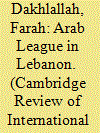

|
|
|
|
|
| Publication |
2012.
|
| Summary/Abstract |
Contrary to expectations, the Arab League has emerged as an active player in the Middle East region over the past decade. The League's roles in negotiations to end the 2006 Israel-Lebanon War and in the brokering of the 2008 Doha Agreement between warring Lebanese factions present two instances of 'partial' and 'direct' contributions to success in resolving major extra-systemic and minor internal conflicts. These developments are part of a global trend of the regionalization or decentralization of security in the post-Cold-War context.
|
|
|
|
|
|
|
|
|
|
|
|
|
|
|
|
| 2 |
ID:
080574


|
|
|
|
|
| Publication |
2007.
|
| Summary/Abstract |
This article is an attempt to provide a corrective to a marked Sinocentrism in contemporary debates on regional integration in Asia. In order to do so, firstly, as a heuristic device, a crucial distinction is made between 'regionalization', as involving multifaceted integrative socio-economic processes, and 'regionalism', defined as a form of identity construction akin to nationalism. Secondly, a degree of historical depth is proposed to better explain recent developments. Finally, throughout the article, an interdisciplinary approach is taken involving employing realist, historical/sociological institutionalist and constructivist perspectives in the area of international relations. The first two East Asian summits are contextualized in relation to various conceptualizations of an Asian Community over the last century or so. Particular attention is given to the 1955 Asian-African Conference in Bandung as a watershed in this evolution. Varying conceptions of East Asia as part of a larger, transpacific regional entity (APEC) and in, and of, itself (East Asian Economic Group/ASEAN +3) are examined. In situating the first two East Asian summits five developments of significance are examined. These are: a continuing Japanese role in setting the regional agenda; the ambivalence of China's positioning vis-à-vis neighbouring countries; the re-entry of Central Asia in the Asian regional equation; India's 'return to Asia'; and efforts to maintain ASEAN's centrality in regional construction. These factors, it is argued, are militating towards a return to the Sino-Indic Asia of Bandung. It is thus suggested that notions of an Asian Community involving only Northeast and Southeast Asia are now rejoined by a concept of a Greater Asia. While the historical roots of this conception partly explain its salience, it nevertheless competes with other complementary - and antagonistic - definitions of an Asian Community of more recent lineage
|
|
|
|
|
|
|
|
|
|
|
|
|
|
|
|
| 3 |
ID:
137146


|
|
|
|
|
| Summary/Abstract |
More than a decade after the European Court of Justice’s “open skies” judgments, is the European Union (EU) now capable of asserting a leading role in the international aviation regime? This article approaches the EU’s external aviation policy through the lenses of role theory and, more precisely, through the threefold connotation of the concept of role: role conceptions, role expectations, and role performance. It finds that there is a converging tendency between the three dimensions and that the gap between external expectations and actual policy behaviour on the one hand, and the EU’s aspiration for a leading role in international aviation on the other, is diminishing. Over time, then, the EU could indeed transform from a regional trendsetter into a leading player in the international aviation regime.
|
|
|
|
|
|
|
|
|
|
|
|
|
|
|
|
| 4 |
ID:
145139
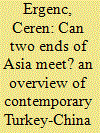

|
|
|
|
|
| Summary/Abstract |
China’s new Silk Road policy, titled “One Belt, One Road,” signals a proactive turn in China’s regional policy towards Central and West Asia. The policy has two dimensions: First, China aims to revitalize the old Silk Road exchange of goods, ideas, and people with trade, energy, and transportation projects. Second, armed with these new connections, China aims to redefine the territories the old Silk Road encompasses as a region in the contemporary international system. Turkey, as one of the countries at the westernmost end of the historic Silk Road, and one of the target countries of China’s new Silk Road diplomacy, welcomes the increasing economic and technological exchange with China. Establishing better contacts with China fits suitably in Turkey’s new foreign policy orientation. While the foreign policies of the two countries seem to be compatible, Turkish domestic political dynamics and public opinion hinder further engagement between the two ends of the Silk Road. The negative public opinion towards China manifests itself in the form of media coverage, protests and lobbying and, at times, it derails bilateral relations. This paper assesses the prospects for bilateral relations in the light of these developments. The paper starts with a historical analysis of Sino-Turkish relations and proceeds with various dimensions of the current relations. Then, it provides an analysis of various public opinion surveys in order to grasp the nature of the Turkish public opinion towards China, and it offers a media framing analysis in order to decipher the specific ways the image of China is constructed in Turkish public opinion. The last part of the paper discusses the domestic political actors that have a role in the perceptions and policies toward China in Turkey.
|
|
|
|
|
|
|
|
|
|
|
|
|
|
|
|
| 5 |
ID:
111112
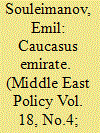

|
|
|
| 6 |
ID:
132075


|
|
|
|
|
| Publication |
2014.
|
| Summary/Abstract |
South Korea's diplomatic and security focus has inevitably been on northeast Asia and its difficult relationship with its northern neighbour, but South Korea also has a role to play in the broader Asian Pacific region. This article analyzes South Korea's increasing economic, political, and cultural links with the wider region, in particular with Southeast Asia, and its role in the development of Asian Pacific regionalism. Utilizing the concept of "middle power," it argues that, while clearly South Korea cannot ignore what is happening in its immediate geographical environment of North-east Asia, it does have the economic and political resources to enable it to take advantage of the opportunities for greater interactions with other parts of the Asian Pacific region, particularly Southeast Asia, if the political will exists.
|
|
|
|
|
|
|
|
|
|
|
|
|
|
|
|
| 7 |
ID:
054380
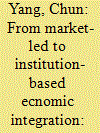

|
|
|
| 8 |
ID:
163391
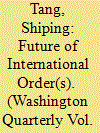

|
|
|
|
|
| Summary/Abstract |
When it comes to the future of the international order, we are now in a new Age of Anxiety. The international order will persist, but it will be less West-centric and fragmented. Although the rules will be more contested, that will not necessarily be politically violent or morally bad, but it will be more bottom-up–increasingly built upon regionalization and coordination.
|
|
|
|
|
|
|
|
|
|
|
|
|
|
|
|
| 9 |
ID:
157795
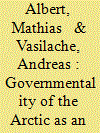

|
|
|
|
|
| Summary/Abstract |
Linked to the image of a wild and still-to-be-explored territory, as well as to images of the region as one of new economic opportunities, discourses on the Arctic also tie in with issues of climate change, cooperation and conflict, Arctic governance, international law and the situation and rights of indigenous people, as well as Great Power politics. Taken together, these aspects characterize a region whose formation is different from regionalization processes in other parts of the world. As the regional peculiarity of the Arctic is reflected by a variety and plurality of representations, discourses, perceptions and imaginaries, it can usefully be analyzed as a region of unfolding governmentality. The present article argues that the prospects for the Arctic are strongly intertwined with perceptions and depictions of it as an international region subject to emerging practices of governmentality. By drawing on both Foucault’s texts and governmentality studies in international relations (IR), we discuss how the Arctic is affected by governmental security rationalities, by specific logics of political economy and order-building, as well as becoming a subject for biopolitical rationalizations and imaginaries. The discourses and practices of governmentality that permeate the Arctic contribute to its spatial, figurative and political reframing and are aimed at making it a governable region that can be addressed by, and accessible for, ordering rationalities and measures.
|
|
|
|
|
|
|
|
|
|
|
|
|
|
|
|
| 10 |
ID:
147736
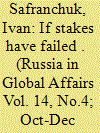

|
|
|
|
|
| Summary/Abstract |
When the Central Asian governments realized that these projects were the main alternatives, the Ukrainian crisis was already raging. It greatly distorted the perception of any initiative by local elites. Their ideas of a geopolitical balance had changed over the previous decade, and now they preferred geopolitical neutrality and were very wary of everything with a shadow of geopolitics. They had long sensed this shadow in the Russian and U.S. proposals, and were therefore more disposed towards the Chinese one. Nevertheless, they were well aware of all the pitfalls and had no intention to end up on the sidelines of the Chinese economy.
|
|
|
|
|
|
|
|
|
|
|
|
|
|
|
|
| 11 |
ID:
149754
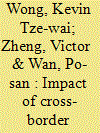

|
|
|
|
|
| Summary/Abstract |
Using official statistics and a pooled dataset of longitudinal surveys, the aim of this article is to examine the impact of the Individual Visit Scheme (IVS) on political trust in Hong Kong. Our multilevel analysis found that the gradual inflow of IVS visitors (mostly overnight visitors) increased political trust in the first few years, but that this trust rapidly diminished in later years, especially after the introduction of the one-year multiple-entry IVS endorsement (which attracted mostly same-day visitors). The main reason for the reduction in the positive impact of the IVS scheme is that the growth in the number of same-day visitors has contributed less to Hong Kong's economy than has the increase in the number of overnight visitors, and has exacerbated several social problems. The impact of mainland visitors has varied across groups with different levels of education. The political trust of people with a senior secondary education has been enhanced more by the increase in overnight visitors and reduced less by the increase in same-day visitors than that of people with a tertiary level of education or a junior secondary education or below.
|
|
|
|
|
|
|
|
|
|
|
|
|
|
|
|
| 12 |
ID:
104034
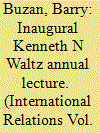

|
|
|
|
|
| Publication |
2011.
|
| Summary/Abstract |
The category of superpower, as distinct from great power, has become naturalized in the discourses about international relations. But 'superpower' has only become common usage since the end of the Second World War and in modern history cannot meaningfully be applied much further than the 19th century. This article argues that superpowers are a historically contingent phenomenon whose emergence rested on the huge inequality of power between the West and the rest of the world that developed during the 19th century. As this inequality diminishes, the most likely scenario for world politics is decentred globalism, in which there will be no superpowers, only great powers. The largest section of the article uses a framework of material and social factors to show why the US is unlikely to remain a superpower, and why China and the EU are unlikely to become superpowers. The following three sections use the same framework to look more briefly at why a world with only great powers is likely to take a more regionalized form; why this might produce a quite workable, decentralized, coexistence international society with some elements of cooperation; and what the possible downsides of a more regionalized international order might be, focusing particularly on the problem of regional hegemony. The conclusions offer five policy prescriptions for living in a decentred globalist world.
|
|
|
|
|
|
|
|
|
|
|
|
|
|
|
|
| 13 |
ID:
117654
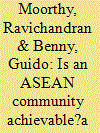

|
|
|
|
|
| Publication |
2012.
|
| Summary/Abstract |
The formulation "ASEAN Community" has been criticized for being too elitist and lacking serious efforts to solicit public opinion. This article examines how the people in Indonesia, Malaysia, and Singapore view the concept of "community building" and the obstacles this initiative may encounter.
|
|
|
|
|
|
|
|
|
|
|
|
|
|
|
|
| 14 |
ID:
137399
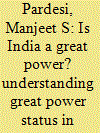

|
|
|
|
|
| Summary/Abstract |
The traditional approaches to great power status - the intuitive criteria, an emphasis on warfare, and system-/global-level capabilities - have serious limitations. These approaches have ignored the implications of the expansion of the European states-system into a global one along with the simultaneous regionalization of world politics. Therefore, a threefold criterion for great power status is proposed - the presence of security-related and economic interests outside of a state's home region, the requisite capabilities, and the demand for this status and its acceptance by other great powers and the regional states. India has emerged as a great power because it meets these criteria in Southeast Asia. India's transformation from a South Asian power into one capable of shaping the regional order in Asia is of theoretical significance.
|
|
|
|
|
|
|
|
|
|
|
|
|
|
|
|
| 15 |
ID:
186853
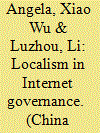

|
|
|
|
|
| Summary/Abstract |
Often analysing ‘the Chinese Internet’ as a national entity, existing research has overlooked China's provincially oriented web portals, which have supplied information and entertainment to substantial user populations. Through the lenses of the critical political economy of media and critical media industry studies, this article traces the ascendance of China's provincial web from the late 1990s to the early 2000s by analysing industry yearbooks, official reports, conference records, personal memoirs, archived webpages, and user traffic data. We uncover interactions between Internet service providers, legacy media organizations, commercial Internet companies, and the central and local governments – each driven by discrete economic interests, political concerns, and imaginaries about the new technology. Delineating the emergence and consolidation of China's provincial web, our study foregrounds the understudied political economy of online content regionalization at scale. Further, it sheds new light on Chinese media policy, Internet governance, and Internet histories, especially the widely noted conservative turn of online cultures after the mid-2010s.
|
|
|
|
|
|
|
|
|
|
|
|
|
|
|
|
| 16 |
ID:
152591
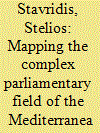

|
|
|
|
|
| Summary/Abstract |
Following the end of the Cold War and the appearance of globalization and new forms of regionalization, new actors have emerged in world politics and changed the traditional practice of diplomacy. New forms of diplomacy range from economic diplomacy to paradiplomacy, cultural diplomacy, or even celebrity diplomacy. Parliamentary diplomacy has also developed its influence in this new world, and there is now a clear “parliamentarization” of world politics. This phenomenon resulted from democratization, globalization, regionalization, and technological developments. There are now three different perspectives on diplomacy: statist (the state speaks with one voice), globalist (the growth of nonstate diplomacy), and postglobalist (combining both state-centric and multicentric realities). This essay falls clearly within the last of these three possibilities. It focuses on the growth of parliamentary diplomacy in the Mediterranean Basin.
|
|
|
|
|
|
|
|
|
|
|
|
|
|
|
|
| 17 |
ID:
107283
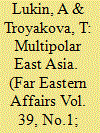

|
|
|
|
|
| Publication |
2011.
|
| Summary/Abstract |
The 6th conference of the International Society for the Study of East Asia was held in Vladivostok on September 9-10, 2010. Beginning from 2000, such conferences have been organized by the Institute of Asian Studies of the Osaka University of Economics and Law and the Center for East Asian Studies of Beijing University. In 2010 the number of the organizers of such conferences increased and included the Far Eastern Federal University, Institute of History, Archaeology and Ethnography of the Peoples of the Far East, and Institute of Geography of the Far Eastern Branch of the Russian Academy of Sciences.
|
|
|
|
|
|
|
|
|
|
|
|
|
|
|
|
| 18 |
ID:
099769
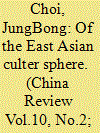

|
|
|
|
|
| Publication |
2010.
|
| Summary/Abstract |
This essay questions the conceptual pertinence of globalization in analyzing the fast growing culture exchanges across east and south East Asia. Critiquing the theoretical backbone of globalization, it proposes a shift to cultural regionalization as an interpretive framework suited to emergent culture topographies of the region. The essay then details the major attributes of culture regionalization by introducing what might be termed the East Asian culture sphere, a temporary crystallization of East Asian culture interdynamics that has emerged in the post cold war juncture and continues to evolve to date. In an attempt to give concrete picture s of both culture regionalization and east Asian culture Sphere, the essay broaches the instance of Hallyu, the Korean wave, a culture crosscurrent arising from the collision of two opposing waves the escalation of political tension based on post/colonial feuds, which remained largely unaddressed during the cold war period, on one hand and the sweeping economic integration and collaboration of east Asia on the other
|
|
|
|
|
|
|
|
|
|
|
|
|
|
|
|
| 19 |
ID:
115620
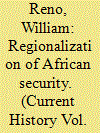

|
|
|
|
|
| Publication |
2012.
|
| Summary/Abstract |
From the perspective of officials in Africa, participating in regional conflict management is now one of the best ways for governments . . . to get international resources to strengthen their own authority.
|
|
|
|
|
|
|
|
|
|
|
|
|
|
|
|
| 20 |
ID:
145135
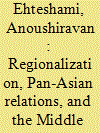

|
|
|
|
|
| Summary/Abstract |
Research on the emerging links between the Middle East (West Asia) and other parts of Asia has grown considerably since late twentieth century. Indeed, the contributions to this special edition of the journal reflect some of the pioneering work taking place on pan-Asian relations encompassing new analysis of the Middle East’s links with the ‘East’—Central, South, and East Asia. The research in this field, looking back into history as well as forward, has grown in response to the changing dynamics of intra-Asian relations following the end of the Cold War in 1990 and the collapse of the Soviet Union as a Eurasian land empire just a year later. The end of bipolarity encouraged new transnational relations and further regionalization of a new world order. As multi-polarity has steadily given way to a state of non-polarity, so the veil has also been lifted on the significant economic and political ties which have grown across strategic regions. In considering strategic regions, it is contended here that Asia is home to the most dynamic of these, in terms of asset accumulation, geopolitical weight, population size, and economic prowess. But it is also significant for the volatility which appears along the fault lines of historical animosity, national security tensions, modern-day rivalries, border and resources disputes, and the strengthening of communalism and divisive role of identity politics. Moreover, the collapse of the Soviet control of much of Central Asia opened up new spaces for exchange in Asia, much encouraged by the exploitation of hydrocarbon reserves of the Soviet successor states in Asia (also Azerbaijan in the Caucasus). But, pan-Asian ties predate the post-Cold War transformations of the global system, and several Asian powers were able to negotiate mutually beneficial links soon after the Second World War. Although evidence of ancient pan-Asian relations is to be found in the Silk Road, systemic shift in our time is clearly leading to a perceptible transfer of the global economic balance Eastwards, which has brought with it the rise of energy-hungry Asian economies in the twenty-first century. Asian demand for energy has changed the complexion of Middle East-Asia relations, and pan-Asian relations in this context are today a reflection of the changing contours of the global political economy.
|
|
|
|
|
|
|
|
|
|
|
|
|
|
|
|
|
|
|
|
|